India to Uzbekistan: Crafting Medical Futures Together.
MBBS in Uzbekistan: One among Indian Students’ Top 5 Choices. More than 8,000 Indian students are studying in Kazakhstan.
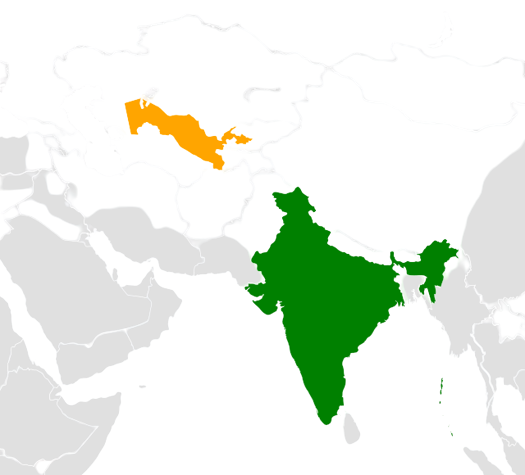
MBBS in Uzbekistan and NMC Guidelines Compliance
NMC Guidelines | Uzbekistan Compliance | Details |
English Medium | ✅ YES | All medical universities in Uzbekistan offer MBBS programs in English, ensuring ease of study for Indian students. |
Minimum 4.5 Years Course Duration | ✅ YES | The MBBS program in Uzbekistan spans 6 years, exceeding the NMC’s minimum requirement of 4.5 years. |
One-Year Internship (in addition to course) | ✅ YES | Indian students are provided with a 1-year internship program apart from the 6-year course duration, meeting the NMC guideline for clinical training. |
Licensing in Country of Study (Independent Medical Practitioner) | ✅ YES | Students can practice as independent medical practitioners immediately after obtaining their MBBS degree, with no separate licensing exam required. |
Completion within 10 Years | ✅ YES | The entire process, including 6 years of study, a 1-year internship, and NEXT preparation, can be completed well within 10 years. |
Detailed Explanation
1. Course Duration
2. Internship
3. Licensing in the Country of Study
4. Completing the Process Within 10 Years
Conclusion
Uzbekistan offers a comprehensive MBBS program that aligns perfectly with the NMC 2021 guidelines, including an additional 1-year internship specifically for Indian students. This structured pathway ensures students receive high-quality education, adequate clinical exposure, and seamless licensing eligibility, making Uzbekistan a top destination for MBBS aspirants from India.
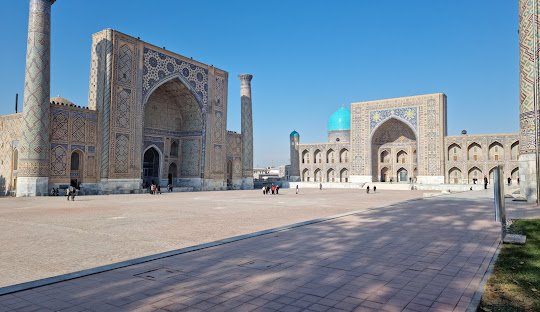
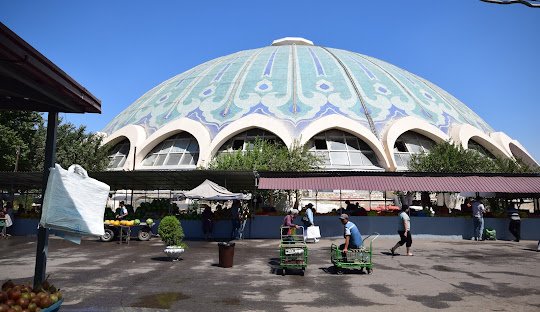

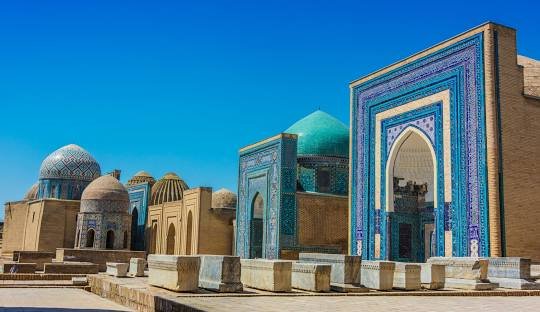
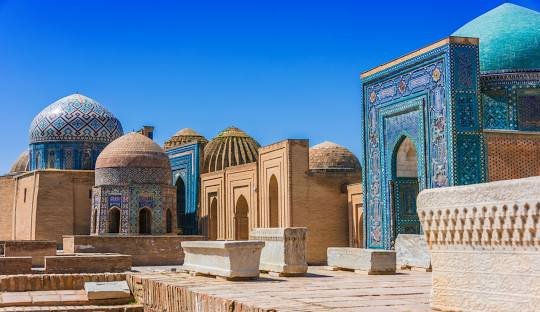
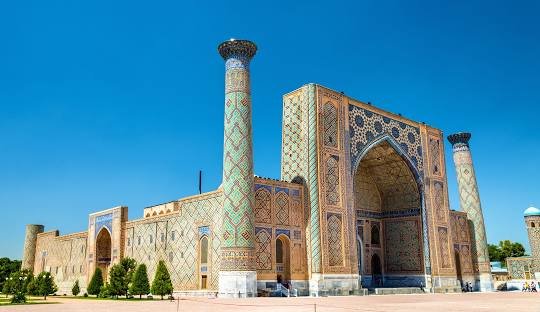
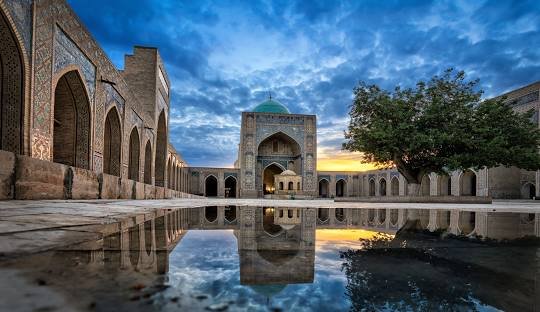
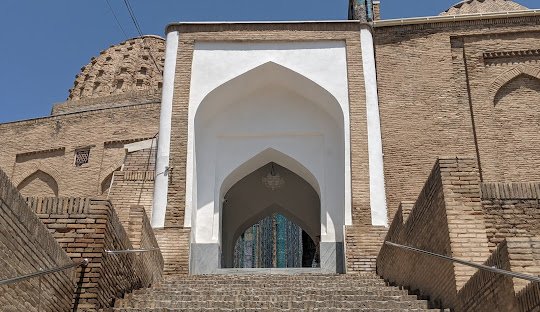

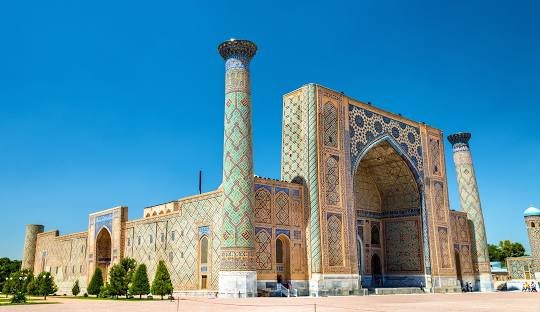
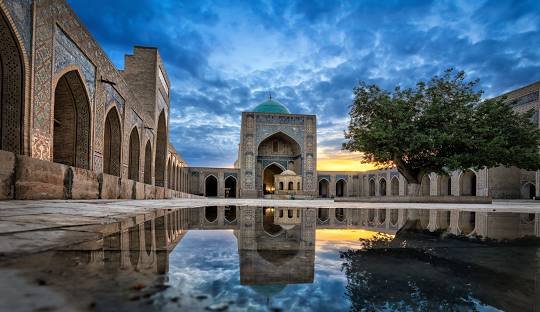
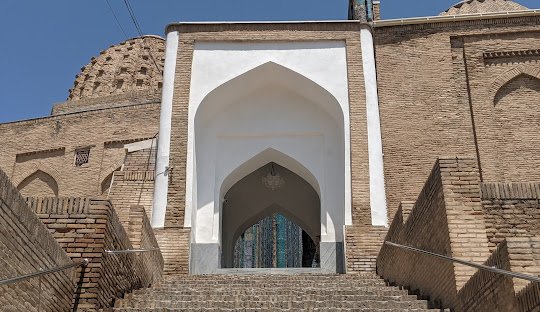
Political Landscape and Leadership: The Republic of Uzbekistan acquired autonomy in 1991, following its affiliation with the Soviet Union since 1924. It operates as an official republic with regular presidential and parliamentary elections. Shavkat Mirziyoyev currently serves as the President.
Geographical and Demographic Overview: Uzbekistan, a resource-rich doubly-landlocked nation, strategically lies in the heart of Central Asia. With a population of approximately 32 million (as of 2017), roughly half of the population resides in urban areas. Uzbekistan’s population constitutes a significant portion of Central Asia’s total population of 68 million individuals.
Economic Strategies and Trade Policies: Since the mid-90s, Uzbekistan has adopted a cautious approach to economic reforms. The country’s trade system is characterized by inflexible tariffs and non-tariff barriers. Key economic policies have aimed to achieve self-sufficiency in grain and energy resources, reduce dependence on imports, and accumulate foreign exchange reserves.
Cultural and Linguistic Landscape: Uzbekistan boasts a diverse and rich cultural heritage shaped by its deep historical roots and picturesque location. The primary language spoken is Uzbek, with Russian commonly used in public governance.
Education and Medical Institutions: Uzbekistan is home to several prestigious Medical Universities, offering a range of degrees in the medical field to both local and international students. These institutions are recognized by major global medical bodies, contributing to the country’s impressive literacy rate of 99.9%.

| Aspect | Details |
|---|---|
| Recognition | NMC and WHO approved |
| Eligibility | Minimum 50% in Physics, Chemistry, and Biology aggregate |
| Course Duration | 6 Years |
| Minimum Tuition Fee with Hostel | ₹ 14,35,000 |
| Maximum Tuition Fee with Hostel | ₹ 17,00,000 |
| NEET | Compulsory |
| IELTS/TOEFL | Not Required |
| Medium of Teaching | English |
Key Features:
Reasons to Study MBBS in Uzbekistan:
Advantages for Indian Students:
Benefits of MBBS in Uzbekistan:
Emerging Choice for Indian Students
Opting for MBBS studies in Uzbekistan has emerged as a promising choice for Indian students, boasting diverse medical examinations, experienced faculty, well-maintained medical facilities, and exceptional food quality.
A Globally Recognized Curriculum
Six-Year English Medium Program
The six-year MBBS program is entirely conducted in English, ensuring a globally recognized standard of education.
A Rising Trend of International Study
Over the years, there has been a notable trend of students leaning towards pursuing MBBS degrees abroad, and the upcoming academic year presents Uzbekistan as a commendable option for Indian medical aspirants seeking international exposure.
Discovering the Rich Cultural Heritage
Uzbekistan, situated in Central Asia, is surrounded by five neighboring countries, including Kazakhstan, Kyrgyzstan, Tajikistan, Afghanistan, and Turkmenistan. Renowned for its rich history and strategic location, the nation is celebrated for its diverse cultural heritage and various ethnic communities.
Quality Education at an Affordable Cost
With a high literacy rate, Uzbekistan offers cost-effective medical education to students from around the world, attracting a significant influx of international students to pursue MBBS degree.
A Unique Learning Environment
The country provides a unique learning environment, facilitating comprehensive training in regional pathology, diagnostic techniques, patient care, and medical practice.
Governmental Focus on Quality Education
Notably, the government of Uzbekistan has made significant investments in providing quality education to medical students, with an increasing number of Indian students choosing Uzbekistan for their MBBS studies.
Accessible Admission Process
Securing admission to an MBBS program in Uzbekistan has become notably accessible, with a well-managed transportation system and a preference for fluent English speakers.
Emergence of Autonomy
The Republic of Uzbekistan acquired autonomy in 1991, marking its departure from the former Soviet Union, a union it had been a part of since 1924. Since then, it has embarked on a transformation towards a market economy. Uzbekistan is an official republic and conducts presidential and parliamentary elections regularly, with Shavkat Mirziyoyev serving as the current President.
Strategic Location and Population
Uzbekistan, a resource-rich, doubly-landlocked country, is strategically positioned in the heart of Central Asia, with a population of approximately 32 million (as of early 2017), with around 50% residing in urban areas. Uzbekistan’s population accounts for about 46% of the total population of 68 million people in Central Asia. In 2011, the World Bank reclassified Uzbekistan from a low-income to a lower-middle-income country.
Economic Reforms and Trade Policies
Since the mid-90s, Uzbekistan has pursued a cautious and gradual approach to economic reforms. The national trade system is characterized by rigidity, with general tariffs and non-tariff barriers in place. Key economic policies have included active state interventions aimed at achieving self-sufficiency in grain and energy resources, promoting import substitution, and building up foreign exchange reserves.
Recognition: NMC and WHO approved
Eligibility: Minimum of 50% in Physics, Chemistry, and Biology Aggregate
Course Duration: 6 Years
Tuition Fees (with Hostel): ₹ 14,35,000 (Minimum) – ₹ 17,00,000 (Maximum)
NEET Requirement: Yes, compulsory
Language Proficiency: IELTS/TOEFL not required
Medium of Teaching: English

Uzbekistan emerges as a promising choice for Indian students in 2023 due to its adherence to the NMC FMGL Regulations of 2021, ensuring the validity of your degree in India for appearing in the NEXT.
Uzbekistan offers cost-effective MBBS programs compared to many other countries, making it a financially viable option for Indian students seeking quality medical education.
Uzbekistan universities offer the opportunity to enroll in some of the world’s oldest institutions, signifying their impressive global standing.
Medical degrees from Uzbekistan are recognized by prominent international medical bodies, enabling Indian graduates to pursue medical careers globally or return to India to practice medicine.
Several medical universities in Uzbekistan offer MBBS programs in English, eliminating language barriers for Indian students and facilitating a smooth learning experience.
Uzbekistan’s medical universities boast modern infrastructure, well-equipped laboratories, and advanced teaching facilities, ensuring a conducive learning environment for aspiring Indian medical professionals.
Uzbekistan’s cultural similarities and warm hospitality make it an inviting destination for Indian students, providing a comfortable and welcoming atmosphere during their academic pursuits.
Uzbekistan is known for its overall safety and peaceful environment, providing a secure and conducive setting for Indian students to focus on their studies and personal growth.
Indian students have a longstanding presence in Uzbekistan universities for MBBS, benefiting from faculties and institutions with extensive experience in educating Indian students. Nevertheless, it is advisable to engage with Rich Global Edu to make an informed choice when selecting the most suitable medical university in Uzbekistan.
Historically, Uzbekistan has upheld its reputation as a friendly nation to India, extending a warm welcome to Indian students and fostering a welcoming environment.
The Indian Embassy in Astana, Uzbekistan consistently extends support to Indian students, offering guidance and assistance throughout their educational journey in Uzbekistan.
Take advantage of our years of experience and Commitment in choosing the right university for each & every candidate, now!
Our Uzbekistan MBBS Advisory, will help you to choose a university that perfectly suits your needs.
Book your Free Counselling Session.
When selecting the right university for MBBS in Uzbekistan, it’s crucial to consider more than just the fees. Apart from budget considerations, students seek institutions with commendable rankings and esteemed reputations. RICH GLOBAL EDU provides comprehensive assistance in securing admissions to the top medical universities in Uzbekistan, ensuring a tailored approach that aligns with each student’s preferences and goals.
We recommend that students assess the FMGE passing percentage of Indian graduates from various medical universities in Uzbekistan. This evaluation offers valuable insights into the performance of Indian graduates in the licensing examination in India, aiding the selection process of an appropriate university.
With extensive experience in facilitating student placements in Uzbekistan, RICH GLOBAL EDU maintains regular communication with Indian students across various medical universities in Uzbekistan, allowing us to provide up-to-date and firsthand feedback. Our commitment lies in guiding students exclusively to the finest medical institutions in Uzbekistan.
Based on comprehensive factors including FMGE passing ratio, fee structure in Indian rupees, student feedback, quality of education, faculty, hostel facilities, availability of Indian food, and various other criteria, the following are considered the top medical colleges in Uzbekistan for Indian students:
Andijan State Medical Institute
Bukhara State Medical Institute
Tashkent State Dental Institute
Samarkand State Medical Institute
Second Tashkent State Medical Institute
Educational Structure and Evaluation Methods
Optimal Learning Atmosphere: MBBS classes in Uzbekistan ensure an ideal learning environment with smaller groups of 15-20 students, encouraging effective student-teacher interaction.
Engaging Academic Approach: The educational approach fosters interactive teaching, allowing students to participate actively and engage in constructive discussions with their professors.
Qualified Faculty for International Students
Proficiency in English Instruction: Competent English-speaking faculty members are dedicated to training international students, facilitating clear communication and comprehensive comprehension of intricate medical concepts.
Emphasis on Practical Learning
Early Hands-on Experience: Practical learning begins early in the curriculum, enabling students to gain practical skills and experience using cadavers, similar to the approach employed in Indian medical education.
Curriculum Structure and Clinical Training
Initial Emphasis on Theoretical Fundamentals: The first two years primarily concentrate on building a strong foundation in theoretical subjects, with most classes conducted on the university campus.
Transition to Clinical Practice: In the third year, students’ academic focus shifts towards practical training in hospitals, allowing them to gain valuable insights and direct exposure to patient care.
Advanced Practical Training: During the fourth and fifth years, the curriculum emphasizes extensive clinical exposure, enabling students to interact with a diverse patient population in various hospitals within the city.
Dedicated Internship Year: The final year is exclusively dedicated to a comprehensive internship, providing students with in-depth clinical experience and preparing them for their future medical endeavors.
Final Examination and Degree Conferment
Culminating Licensing Assessment: Upon completing the program, students must successfully pass a rigorous final government licensing examination.
Awarding of Degrees: Successful candidates are awarded their MBBS/MD (Physician) degrees, marking the successful completion of their educational journey in Uzbekistan.
In November 2021, the National Medical Commission (NMC) released the “Foreign Medical Graduate Licentiate Regulations, 2021,” which apply to foreign medical graduates seeking permanent registration in India, not exclusive to Uzbekistan. These regulations outline specific criteria:
Course Duration: The General Medicine course in Uzbekistan spans 6 years, the same for local and foreign students, meeting the requirement of a 54-month duration.
Internship: NMC stipulates a 12-month internship in addition to the 6-year course. Uzbekistan medical universities provide clerkship/clinical rotations for 12 months or more.
Medium of Instruction: Uzbekistan universities teach in English. However, proficiency in the Local language is essential for patient interactions during hospital visits and local communication.
At the end of course, all students must pass a final government licensing exam, if it is present in the country of study, as per latest NMC norms. (The advantage is that in Uzbekistan there is no separate licensing exam after the completion of the MBBS/MD degree. Immediately after the degree students are allowed to practice as a doctor. This is in contrast to countries like Russia, where the licensing exam is held in Russian language.)
As of 2023, very few countries meet the FMGL Regulations. If you study in Uzbekistan, remember:
Complete your foreign medical graduation course within ten years from enrollment.
Degrees from universities with a bilingual pattern may not be valid in India.
To ensure the validity of your degree in India, clear the NEET exam before admission. MBBS abroad without NEET may not allow you to sit for NEXT.
Clear the local Government’s licensing exam.
MBBS programs in Uzbekistan typically start their intake in September and this is the most popular intake among Indian students.
Prospective students are advised to commence the admission process in July to secure enrollment.
The classes for the MBBS program usually begin in October.
Early application is recommended due to the limited availability of seats.
The application process for MBBS programs in Uzbekistan doesn’t adhere to a universal deadline. Each university sets its own specific closing date, often based on the filling of available international student slots. Consequently, the last date varies depending on when a university’s seat quota is met or the individual date specified by the university.
To ensure a strong application, it’s advisable to apply immediately after taking the NEET exam, provided you are confident about your qualification. Notably, qualifying NEET is a prerequisite for MBBS admission abroad. If you have already cleared NEET in the previous two years, consider applying in May.
Classes typically commence in October. Early application is highly essential as the process involves various documentations and visa applications, which will take around a month or so after getting the admission letter.

Uzbekistan is renowned for its reliable and affordable medical education.
Several government-funded medical colleges in Uzbekistan are recognized by bodies such as MCI and WHO.
The language of instruction in Uzbekistan’s medical colleges is predominantly English, facilitating a seamless learning experience for Indian students.
Uzbekistan boasts excellent infrastructure, coupled with a delightful overall climate.
The MBBS course in Uzbekistan emphasizes the scientific aspects of education.
The cost of living in Uzbekistan is generally low, making it a favorable choice for students.
Traveling to Uzbekistan is convenient, with numerous non-stop flights available from India.
Students can choose to reside in hostels or apartments with high-class facilities and a secure living environment.
Many colleges and schools have Indian mess facilities, ensuring a familiar culinary experience for Indian students.
Students have the option to pursue part-time jobs within the college, alleviating the need to search for internships outside the campus.
Language Barriers:
Indian students may face challenges due to language barriers.
Cultural and Environmental Adaptation:
Adjusting to a new culture and environment can be initially challenging for some Indian students studying in Uzbekistan.
Visa Renewal Process:
Some students may encounter difficulties in the visa renewal process, which can be a potential challenge during their stay in Uzbekistan.
Cold Climatic Conditions:
The cold climate of Uzbekistan might pose a difficulty for students who are not accustomed to such weather conditions.
FMGE Passing Percentage:
Students might face challenges in clearing the Foreign Medical Graduate Examination (FMGE) upon their return to India, potentially affecting their ability to practice medicine in India.
Quality of Medical Education:
Some students may find that the overall quality of medical education in certain institutions in Uzbekistan is not on par with their expectations.
Misguidance is a prevalent issue among many consultancies that lack firsthand knowledge of the actual situation in universities. Choosing a reliable consultancy becomes imperative.
NOTE: RICH GLOBAL EDU’s team has personally visited medical colleges in Uzbekistan, equipping us to guide students effectively.
Adjusting to the cold climate poses a challenge for many students. Notably, the weather remains below zero degrees for 2-3 months annually.
The reality is that there are no government, university, or NGO-sponsored scholarships for MBBS in Uzbekistan. Many claims about scholarships are often marketing strategies, and the actual provision of scholarships remains elusive.
Traditionally, a scholarship entails financial aid provided to support a student’s education, typically awarded based on academic or other notable achievements. However, the expectation of a significant reduction in the fee structure through a scholarship is not feasible in this context. Generally, the financial responsibility of funding the education either falls upon the student’s parents or necessitates the acquisition of an education loan.
While a few universities may offer scholarships based on students’ academic performance, such opportunities are limited and not guaranteed for every student. It is advisable to plan your education based on your budget rather than relying on potential scholarships.
Securing an education loan for pursuing MBBS in Uzbekistan is indeed possible, although it might require some effort as not all banks readily offer loans for studying abroad.
Loan Amount and Application Process
Banks typically offer loans of up to ₹7 or 7.5 lakhs without the need for any collateral, whereas for higher loan amounts, collateral might be required. During the loan application process, banks will scrutinise parental documents alongside essential details such as the admission letter, which can be facilitated with the support of Rich Global Edu.
Preferred Banks and Interest Rates
To initiate the loan process, it is advisable to approach Government Banks or Public Sector Undertaking (PSU) banks such as Canara Bank, State Bank of India, Allahabad Bank, or State Bank of Mysore. It is recommended to first approach the bank where you hold an existing account. The interest rates are typically in the range of 10-13% for loans exceeding INR 4 lakh and 7-9% for loans below INR 4 lakh, with compound interest calculations being employed by the bank.
Important Considerations
The bank disburses the loan on a yearly basis, and failure in the initial year might affect subsequent loan disbursements.
The process of securing an education loan might require applications at multiple banks before obtaining approval.
It is crucial to gather detailed information from the bank regarding the repayment schedule and the total interest amount to be paid.
Documents Required for Education Loan
Admission letter from the university
Completed loan application form
Passport-sized photographs
Proof of identity (such as Aadhar Card, PAN Card, or Passport)
Proof of residence (such as Aadhar Card, Voter ID, or Passport)
Academic records of the student (mark sheets, certificates, etc.)
Admission acceptance letter and fee structure from the university
Proof of admission-related expenses (hostel fees, tuition fees, etc.)
Proof of parents’ income and employment
Income tax returns of the co-applicant or guarantor, if applicable
Bank account statement of the last six months of the co-applicant or guarantor
Collateral documents, if applicable
The MBBS course syllabus in Uzbekistan is comprehensive and similar across all medical universities. It covers both theoretical and clinical subjects and is structured as follows for Indian students:
Year-wise Breakdown of Subjects
First Year
Second Year
Third Year
Fourth Year
Fifth Year
Sixth Year
This structured curriculum ensures that students receive a well-rounded medical education that covers both theoretical knowledge and practical clinical experience.





Accommodation Arrangements for Indian Students
Indian students are typically provided accommodation within the university’s hostels for the entire duration of their MBBS program in Uzbekistan.
Initially, it is mandatory for new students to reside in the university’s hostels for at least one year, primarily due to their limited knowledge of the local language for effective communication with the residents.
After the first year, students have the option to either continue residing in the university’s hostels or choose to rent a flat or apartment with their peers, should they wish to explore alternative accommodation options.
To ensure a comfortable living environment, separate hostel facilities are designated for Indian boys and girls, often allocated within distinct blocks or wings of the same hostel building.
Safety and Security Measures
Hostels, whether managed by the university or private entities, are equipped with comprehensive safety features, including CCTV surveillance systems at critical locations and fire alarms in every room, prioritizing the safety and security of international students.
Entry and exit times from the hostel premises are regulated, with set times of 6:00 AM and 8:00 PM respectively. A dedicated security guard is present to monitor the movement of students and visitors within the hostel premises.
Facilities and Amenities
Each hostel floor is equipped with a communal kitchen, enabling Indian students to prepare their meals as per their preferences.
Furthermore, reading halls, sports facilities, and laundry services are readily accessible within both government and private hostels.
Rooms are furnished with essential amenities, including study tables, chairs, lamps, beds, bed sheets, pillows, and wardrobes. The hostel administration facilitates furniture repairs in case of damages and provides weekly exchanges for bedding items.
To ensure comfort during the colder months, rooms are equipped with radiators for efficient heating.
Additional Amenities and Services
Essential utilities such as electricity, hot and cold water, and cooking gas are typically included in the hostel fee for government and private hostels in Uzbekistan. However, when opting for private accommodation, additional charges may apply based on usage.
Students have the flexibility to choose between 2/3/4 seater rooms based on availability and can request room changes by submitting a formal application to the hostel administration.
Hostel dining facilities, typically mandatory for first-year Indian students, offer the convenience of an Indian mess serving breakfast, lunch, and dinner at a monthly cost ranging between USD 100 to 120. From the second year onwards, students have the option to continue availing the Indian mess services on a paid basis or utilize the hostel kitchen facilities for self-cooking purposes.
Studying MBBS in Uzbekistan presents a notably cost-effective option, particularly when compared to private medical universities in India and those in countries like the USA, UK, Australia, and the EU. While the tuition fee constitutes a significant part of the expenses, other essential costs should be considered when selecting a medical university in Uzbekistan.
Below is an approximate breakdown of MBBS fees in Uzbekistan for Indian students, listed in Indian Rupees:
Expense Category | Cost Range (in INR) |
Tuition Fees | ₹2.50L – ₹4.50L per year |
Hostel Fees | ₹30,000 – ₹85,000 per year |
Indian Mess Fees | ₹8,000 – ₹10,000 per month |
Travel Expenses | ₹30,000 – ₹35,000 (one-way) |
Medical Insurance | ₹5,000 – ₹15,000 per year |
Visa Extension Fees | ₹5,000 – ₹10,000 per year |
Personal Expenses | ₹5,000 – ₹15,000 per month |
NEXT Online Coaching (wherever applicable) | ₹5,000 – ₹15,000 per year |
One-time Charges (like admission fees, etc) | ₹35,000 – ₹1,00,000 (one-time) |
Application, Documentation & Visa processing charges | ₹1L – ₹1.50L (one-time) |
| Name of College | Total Tuition with Hostel (6 years in USD) | Total Tuition with Hostel (6 years in INR) |
|---|---|---|
| Andijan State Medical Institute | $17,000 | ₹13,60,000 |
| Tashkent Medical Academy | $18,000 | ₹14,40,000 |
| Second Tashkent State Medical Institute | $19,000 | ₹15,20,000 |
| Samarkand State Medical Institute | $19,208 | ₹15,36,640 |
| Bukhara State Medical Institute | $21,500 | ₹17,20,000 |
| Tashkent State Dental Institute | $22,500 | ₹18,00,000 |
The medium of instruction for the MBBS program in Uzbekistan is primarily English, making it convenient for international students, including those from India, to comprehend the course material effectively.
Yes, the majority of the medical colleges in Uzbekistan are recognized by international medical bodies such as the World Health Organization (WHO) and the Medical Council of India (MCI), ensuring the credibility and global acceptance of the degrees offered.
The basic eligibility criteria for Indian students to apply for MBBS in Uzbekistan typically include a minimum of 50% in Physics, Chemistry, and Biology aggregate in their 10+2 examinations, along with qualifying the NEET examination.
The MBBS program in Uzbekistan generally has a duration of six years, including both theoretical and practical training, followed by a compulsory internship.
Medical degrees obtained from accredited universities in Uzbekistan are recognized by the Medical Council of India (MCI), allowing graduates to practice in India after successfully clearing the required licensing examinations.
The living environment for international students in Uzbekistan is generally conducive to learning, with various universities providing comfortable accommodations, a multicultural atmosphere, and ample opportunities for cultural engagement.
Medical colleges in Uzbekistan boast experienced faculty members with a strong emphasis on practical learning and well-equipped infrastructure, including modern laboratories and advanced medical facilities.
Uzbekistan’s MBBS curriculum aligns with international standards, emphasizing a comprehensive understanding of medical sciences, practical exposure, and clinical training to produce competent medical professionals.
The process for obtaining a student visa for studying MBBS in Uzbekistan involves submitting necessary documents, including the acceptance letter from the university, proof of financial means, and a valid passport, among others. It’s advisable to consult the Uzbekistan embassy or consulate for detailed visa guidelines.
RICH GLOBAL EDU will take care of the entire admission, documentation and Visa processes.
Uzbekistan is considered a safe country for international students, with a low crime rate and a welcoming attitude towards foreigners. However, it’s advisable for students to adhere to general safety precautions and follow the guidelines provided by their respective universities.
While adapting to a new culture may pose some initial challenges, Uzbekistan’s multicultural society is generally welcoming and accommodating, offering ample opportunities for international students to engage with the local culture and customs.
Hostel facilities for international students in Uzbekistan are well-maintained, providing comfortable living spaces, recreational amenities, and a conducive atmosphere for academic and personal growth.
Graduates from Uzbekistan who wish to practice medicine in India need to clear the Foreign Medical Graduate Examination (FMGE) conducted by the National Board of Examinations (NBE) to obtain medical licensure.
As per the latest NMC norms, the Indian students must clear the local licensing exam conducted by Uzbekistan Government before appearing to FMGE.
International students who prefer off-campus accommodation in Uzbekistan can explore various options, including private apartments and rental accommodations, with the assistance of local real estate agents and student support services.
Uzbekistan offers a rich and diverse culinary tradition, with various options available for international students, including vegetarian, vegan, and other dietary preferences. Many universities also cater to international students’ dietary requirements within their campus facilities.
Uzbekistan provides comprehensive medical facilities and healthcare services, ensuring accessible healthcare for all, including students. Many universities also have tie-ups with local hospitals and medical centers, providing students with easy access to medical care when needed.
Yes, some universities in Uzbekistan may offer opportunities for international students to extend their stay for clinical rotations or internships, allowing them to gain additional practical experience and exposure to the local healthcare system.
Countries for MBBS Abroad
Top Universities for MBBS
FAQs
MBBS in Moldova
MBBS in Nepal
MBBS in USA
© 2024 Rich Global Edu
For security purposes, please solve this simple puzzle to verify you are human before sending an OTP.